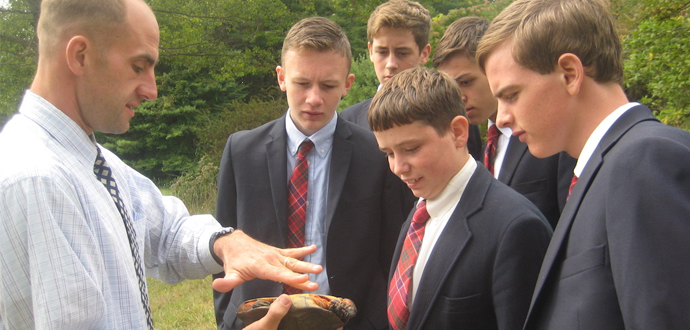
The academy curriculum includes a series of classes in the natural sciences emphasizing natural history and including botany, zoology, earth sciences, biology, and physics. Natural History is the biological discipline that seeks to approach the living organism on the level of the individual in its own sphere in order to arrive at the truth through observation, hypothesis, and experiment. Natural History involves a poetic, philosophic, and imaginative approach to the natural order, seeking to experience first-hand the realities studied and appreciating the beauty inherent in the balance and processes of the created order.
We initially stress direct contact with nature by making use of the possibilities afforded by extended field trips. This serves to develop observational skills in addition to increasing knowledge and fostering a healthy respect and love for the created order. Students learn the names and properties of natural objects and are required to clearly describe their observations. This first, participatory knowledge of nature supplies the necessary foundation for a true understanding of the created order. A sense of wonder towards the inscrutable mysteries of nature provides the impetus towards a more mature comprehension of the ways of the world. The first goal, then, is the general experiential knowledge that everyone should possess. Only then do the students advance to the more theoretical and specialized studies.
The next focus is on the art of scientific observation in the natural sphere and the strategies, tactics, and goal of the science. Special attention is given to the development of the eye to see things with more clarity through exercises in observation, artistic rendition, and guided field investigations. The students are challenged thereby to discover and attempt the process of natural history to strengthen their powers of perception and come to the truth about living things in the natural realm via experience, examination, and experiment. Studies are done in animal behavior (ethology) and instinct as well as a consideration of the two-fold role of man in nature as a steward of God’s creation: the poetic and practical. The objective of the course is to develop in the students an eye and imagination that will grow into a vision of the Divine image as it subsists in the things that He has made.
Seniors advance in their scientific pursuits through the study of classical conceptual physics. This course is named from the Greek root of the word “physics” meaning “nature.” It derives its approach to the science from the ancients, despite its resemblance to a modern physics course. In fact, this course might be more accurately described as a “history of science” or even a “philosophy of science” rather than “physics.” The purpose of the course is to give students an understanding of the development of ideas about the physical world and a perspective from which to judge the accomplishments of modern science.